I’m not a huge water person, but I LOVE hot springs. After a day of hiking or hours in the car on a road trip, being able to sit in some warm water, outdoors, surrounded by nature… bliss.
Thankfully, Western Canada has some great hot springs. In fact, all of the hot springs in Canada are in British Columbia, Alberta, and Yukon Territory. Sorry Eastern Canada – we win this one 🙂
In this guide, I’ve got info and directions for the best hot springs in Canada. These hot springs are all easy to access by car, although some require a short hike or an easy to arrange boat tour.
Note: There are dozens of other hot springs in Canada, but they require hours of bushwhacking or they are really more warm springs, than hot, so I left them off this list.
Hey there: Some of the links in this post are affiliate links, which means I earn a small commission at no extra cost to you if you make a purchase. Thanks for supporting my website! -Taryn
Hot Springs Etiquette
Hot springs exist in unique and fragile ecosystems. If you visit an undeveloped hot spring, tread lightly to minimize your impact. Some hot springs in British Columbia have gotten overrun with trash or closed due to human-bear conflicts. Learn about Leave No Trace to protect our hot springs.
Here are some basic tips for hot springs etiquette:
- Pack out all trash with you. Avoid bringing glass bottles to hot springs.
- Use washrooms or outhouses. Every hot spring on this list has a toilet nearby. Please use them to prevent the spread of disease, which can get into the hot springs.
- Do not use soap or shampoo in the hot springs. It pollutes the pools, kills plants and fish, and creates gross algae blooms.
- Keep your dog out of the water. Dogs carry diseases like leptospirosis that thrive in warm water.
- Be considerate of other users. Many people come to hot springs to relax, not to party.
- Bring a water bottle and drink lots of water. Otherwise, you can get dehydrated or overheated easily.
- Bring some flipflops or sandals to wear around the pools. Undeveloped springs often have sharp or uneven rocks. At commercial springs, sandals are nice to have for sanitary reasons.
- At natural springs, be prepared to see some nudity. It’s often not officially permitted, but it’s still very common, especially at night. But please keep things PG if you visit the hot springs with a partner!
- If you plan to travel on backroads or hike to hot springs, leave a trip plan with a friend and carry the 10 Essentials.
Hot Springs Resources
By far the best book about Canada’s hot springs is Hot Springs of Western Canada. I used an earlier edition of this book for years and recently picked up the 4th edition. It has tons of info on every hot spring, including tons of really obscure ones that are hard to reach.
If you plan to visit any of the undeveloped hot springs in Canada, you’ll have to drive on some remote logging roads. These roads have lots of confusing junctions, which makes navigation difficult. And there’s usually no cell service out there. I always bring a copy of the Backroad map book to prevent getting lost.
I’ve also made a custom hot springs Google map for you. It includes the location of every single Canadian hot spring I mention in this post. Click the map to navigate around. As you can see, most of the hot springs on the map are in British Columbia, or very close to it.
Hot Springs in the Vancouver Area
There are several hot springs near Vancouver and in the Sea to Sky corridor near Whistler.
Harrison Hot Springs
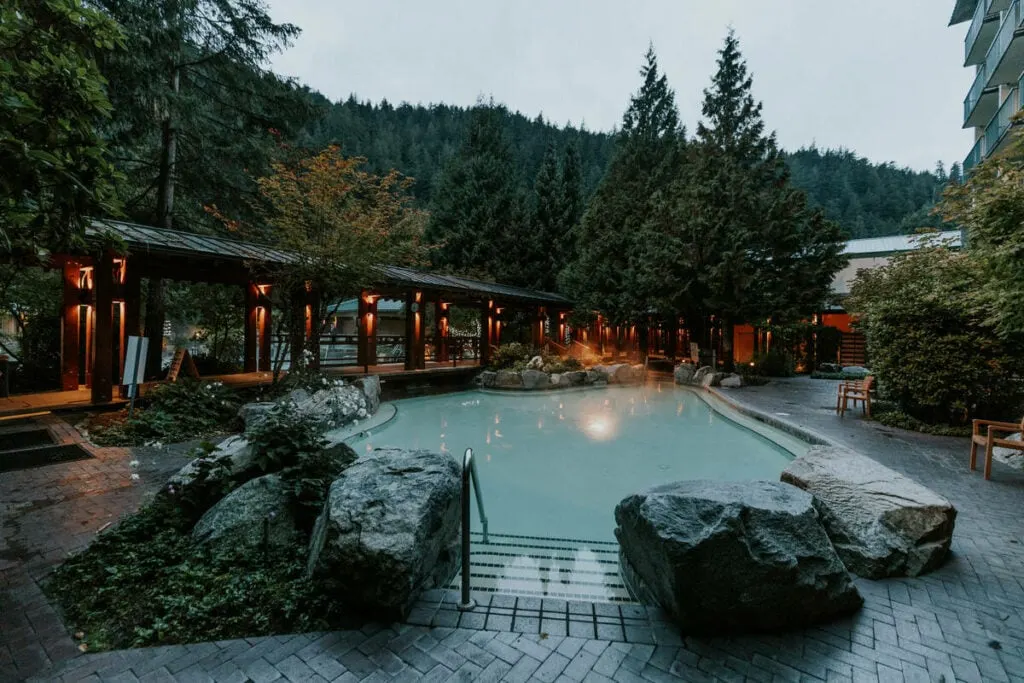
Harrison Hot Springs is a small resort community in the Fraser Valley just east of Vancouver. The springs bubble up along the lakeshore, then are piped into a series of pools at the Harrison Hotsprings Resort as well to a public community pool.
The Harrison Hot Springs Resort is a hotel with a spa. They have two indoor pools and three outdoor pools of varying temperatures. The whole thing has a resort/spa atmosphere with rock features and deck chairs. It’s a family-friendly place, but there is an adults-only pool if you don’t want to share space with splashing kids.
You must book a room at the hotel to access the pools. Unfortunately, there are is no day-use access. I’ve never soaked here, but my husband did a charity bike ride that included access to the hot springs. He said it was amazing after riding over 100km!
You can soak in the exact same water in a less luxurious setting at the Harrison Hot Springs Public Pool. It’s basically an indoor community centre-style pool that happens to be naturally hot.
How to get to Harrison Hot Springs: From Vancouver take Highway 1 east. Then take Highway 9 to Harrison Hot Springs. Once you are in town it’s easy to find both the resort and the public hot springs pool. Here are Google Maps driving directions.
Public Pool Cost: Prices are not posted online anywhere, but the last info I have says it is $15 for adults.
Resort Cost: Rooms start at $179/night and include access to the hot springs.
Where to Stay: Harrison Hot Springs Resort
Keyhole Hot Springs (Lilwatatkwa7)
Note: Keyhole Hot Springs has been closed since November 2023 due to slope destabilization from a a wildfire and have no re-opening date. The springs are usually closed between April 1st and November 15th each year due to bears.
The picturesque Keyhole Hot Springs were seldom visited until a few years ago when they got REALLY popular thanks to social media. Part of their popularity is that these hot springs are not too far from Vancouver and Whistler. They are located west of Pemberton on gravel logging roads.
A 2-kilometre long trail leads down from the road to the banks of Pebble Creek. (The hot springs are also sometimes called Pebble Creek Hot Springs.) There are a few small pools wedged against the steep bank. Each holds one or two people. The lower pools can sometimes be flooded by the river.
There is an outhouse at the parking lot and a campground on the trail to the pools. Unfortunately with increased use and some very careless campers, the area started to attract black bears and grizzly bears. After a few scary incidents, the entire area is now closed from April 1st to November 15th each year.
Getting to Keyhole Hot Springs: Since the hot springs are located on a remote backroad that isn’t plowed, you need a 4wd and winter driving experience or a snowmobile to get to the hot springs during the months they are open.
From Pemberton, drive Pemberton Meadows Road for 23.5km, and then turn right on Lillooet Forest Service Road. Stay on this road for 20km then watch for the sign for the hot springs on the right-hand side.
Cost: Free
Where to Stay: You can walk into the unofficial campsites near the springs, but be prepared for winter camping conditions. Alternatively, book a hotel in Pemberton.
Tsek Hot Springs
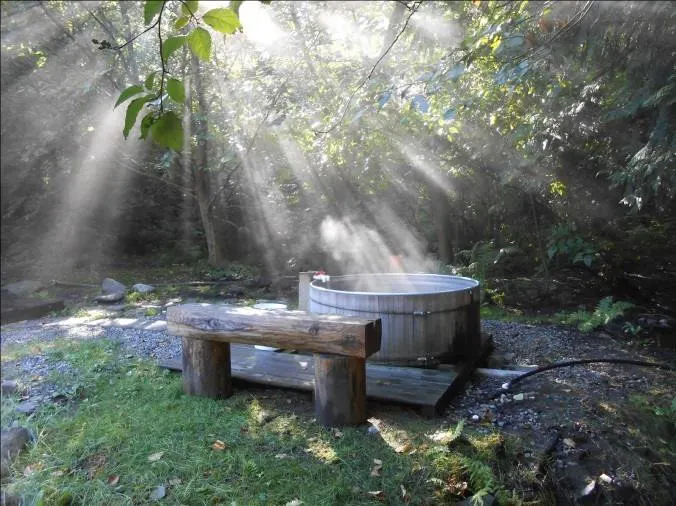
Note: As of December 2024, Tsek Hot Springs remains closed. The St’át’imc First Nation have chosen not to reopen the springs following the pandemic.
The Tsek Hot Springs are located on a remote (but accessible) forest service road east of Pemberton, BC. They are also known as Skookumchuck Hot Spring or St. Agnes Well. In the last decade, these hot springs have reverted to their traditional name, Tsek, pronounced “chick”. It means water droplet or dripping water.
Tsek Hot Springs have been run by the St’át’imc First Nation for the last decade or so. The waters of the springs are important to their culture and spirituality, so you need to be respectful if you visit. I haven’t visited these springs, but I hear they have a rustic feel.
Water from the hot spring is piped into 11 tubs. Four of them are hot water and the rest are hot water with a cold water tap so you can adjust the temperature. There’s also a cold water tub with water from a nearby creek. There is a change house and outhouses.
How to get to Tsek Hot Springs: From Pemberton, go north on Highway 99 through Pemberton and Mount Currie. Shortly after the Lillooet Lake Bridge, go right onto In-SHUCK-ch Forest Service Road. This is a gravel road, but it is in good shape and is fine for all vehicles. Follow this road for 47km along the shores of Lillooet Lake and the Lillooet River. The drive will take about 1.75 hours. Here are Google Maps driving directions.
Cost: Adults: $7.50; Seniors and Youth: $5; Children 15 and under: free
Where to Stay: Camp at the springs or stay in nearby Pemberton.
Sloquet Hot Springs
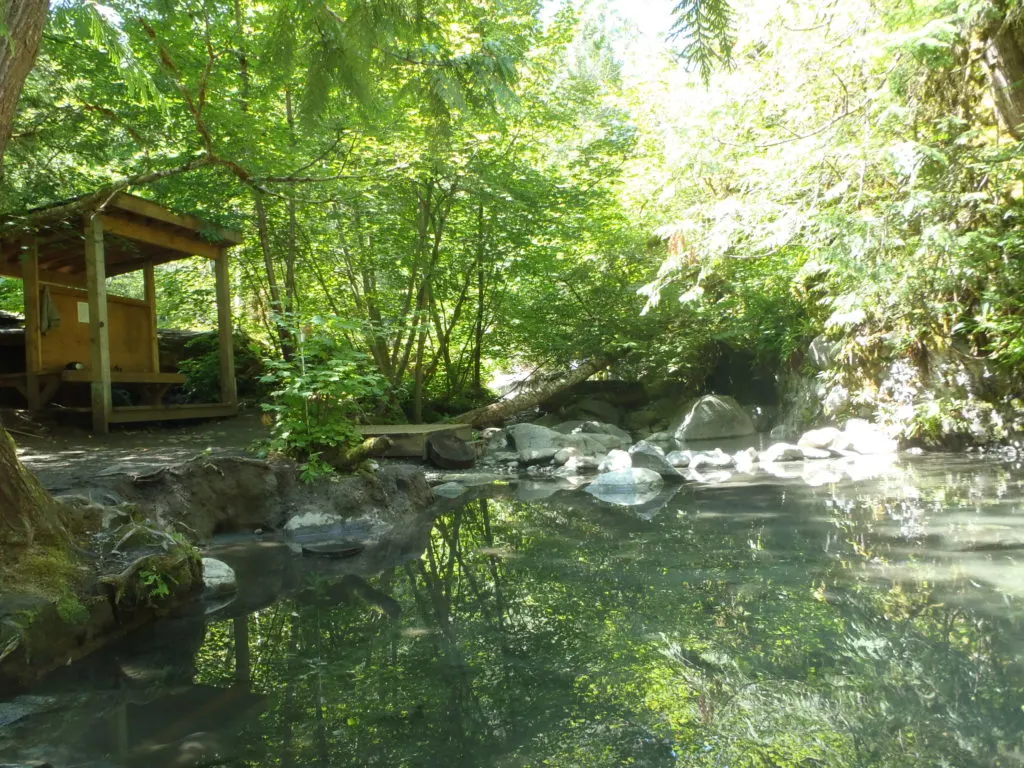
Sloquet Hot Springs are just down the road from Tsek. It can be a bit of a party spot with drunken campers and loud music. (I had a pretty sleepless night there about 15 years ago.)
However, for the last decade, the local Xa’xtsa First Nation has managed the site on behalf of Sites and Trails BC. I’ve heard it has calmed down a bit now that there is an on-site caretaker. It’s still really busy on long weekends though.
To reach the springs, you’ll have to take a short but steep trail down to the banks of the Sloquet River. The hot springs bubble down over a hot waterfall into a small, shallow pool that is too hot for most people. From there, the water trickles into a series of natural rock pools towards the river, getting cooler as it goes downhill. It’s a pretty gorgeous setting.
There’s no change house here, so get your suit on in your car. Outhouses are located up the hill in the campground.
How to get to Sloquet Hot Springs: From Pemberton, go north on Highway 99 through Pemberton and Mount Currie. Shortly after the Lillooet Lake Bridge, go right onto In-SHUCK-ch Forest Service Road. This is a gravel road, but it is in good shape and is fine for all vehicles.
Follow this road for 76km to a bridge over the Lillooet River, passing Tsek Hot Springs. Turn left onto Lillooet West Forest Service Road and drive for 4km. Next, turn right onto Sloquet Forest Service Road. Follow this road for about 8.5km to the hot springs. Note: In winter the Sloquet Road is not plowed and will be impassable.
Cost: $10
Where to Stay: Camp at the springs or stay in nearby Pemberton.
READ NEXT: 40 Cheap and Free Things To Do in Whistler
Hot Springs on Vancouver Island
There is only one hot spring on Vancouver Island: Hot Springs Cove near Tofino.
Hot Springs Cove
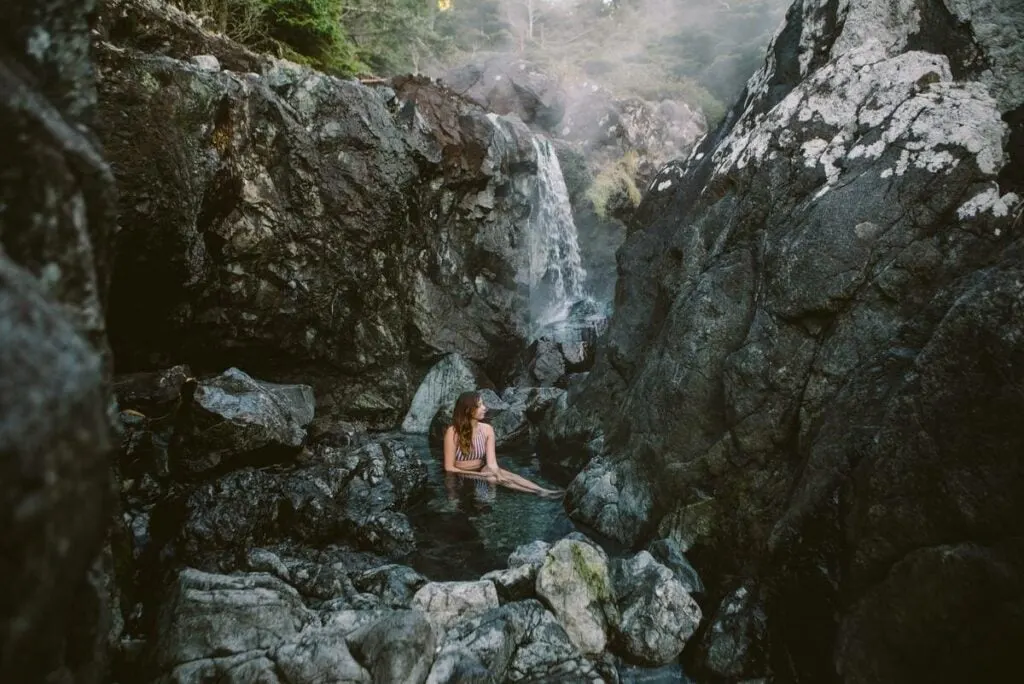
Hot Springs Cove is a unique hot spring is located in Maquinna Provincial Park in Clayoquot Sound on the west side of Vancouver Island. The nearest town is Tofino.
Hot water bubbles up through the bedrock into a large fissure in the rocks, before flowing into the ocean. There are a series of natural rock pools that descend all the way to the sea. At high tide, only a few of the pools are exposed. This hot spring has been on my bucket list for a LONG time, so I can’t wait to visit it.
The hot spring is at the end of a 1.5km long boardwalk trail. There is an outhouse and a change room near the springs. Apparently, the rocks can be slippery and you may need to do some clambering around to get into the pools. Bring water shoes or sandals to make it easier.
How to get to Hot Springs Cove: The only way to get to Hot Springs Cove is by boat or plane from Tofino. Thankfully, it’s pretty easy to arrange with several tour operators offering trips. The boat ride takes about 1.5 hours and the plane ride is about 20 minutes. Many of the boat rides can also be combined with whale watching tours.
Cost: There is a day-use fee of $3 to access the provincial park. Boat tours cost about $240/person for adults. Floatplanes start at about $375/person.
Where to Stay: Tofino has lots of hotels and rental condos.
Hot Springs in the Kootenays
There are tons of hot springs in the Kootenays, many of them in adorable small towns.
Canyon Hot Springs
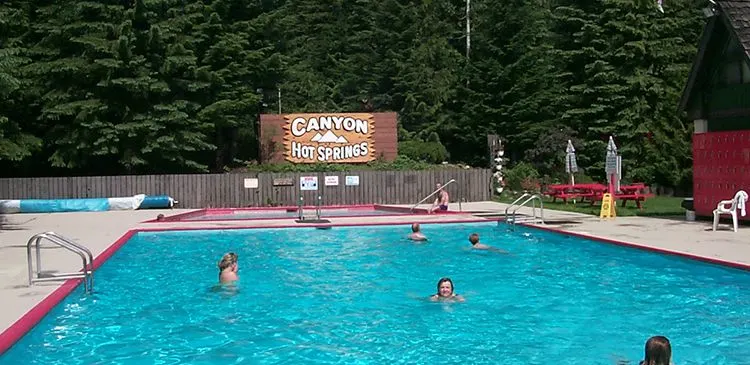
Canyon Hot Springs are located right along Highway 1 so they make a good road trip pit stop. Unfortunately, I’ve never had time.
The hot springs bubble out of the mountain at a temperture of about 25C. They are piped to the nearby resort where they are heated slightly for better soaking. There are two pools. The family pool is 32C, while the soaking pool is 40C. The resort was built in the 1970s and looks to be showing its age a bit. The pools are only open between May and September.
How to get to Canyon Hot Springs: Canyon Hot Springs is located on Highway 1 in between Mount Revelstoke National Park and Glacier National Park. It’s 33km east of Revelstoke and 116km west of Golden. Here are Google Maps driving directions.
Cost: Adults: $16.50, Kids and Seniors: $14.25, Kids 4 and under: free
Where to Stay: Canyon Hot Springs Resort has cabins and camping on site. But you’ll find nicer accommodations in Revelstoke.
Halcyon Hot Springs
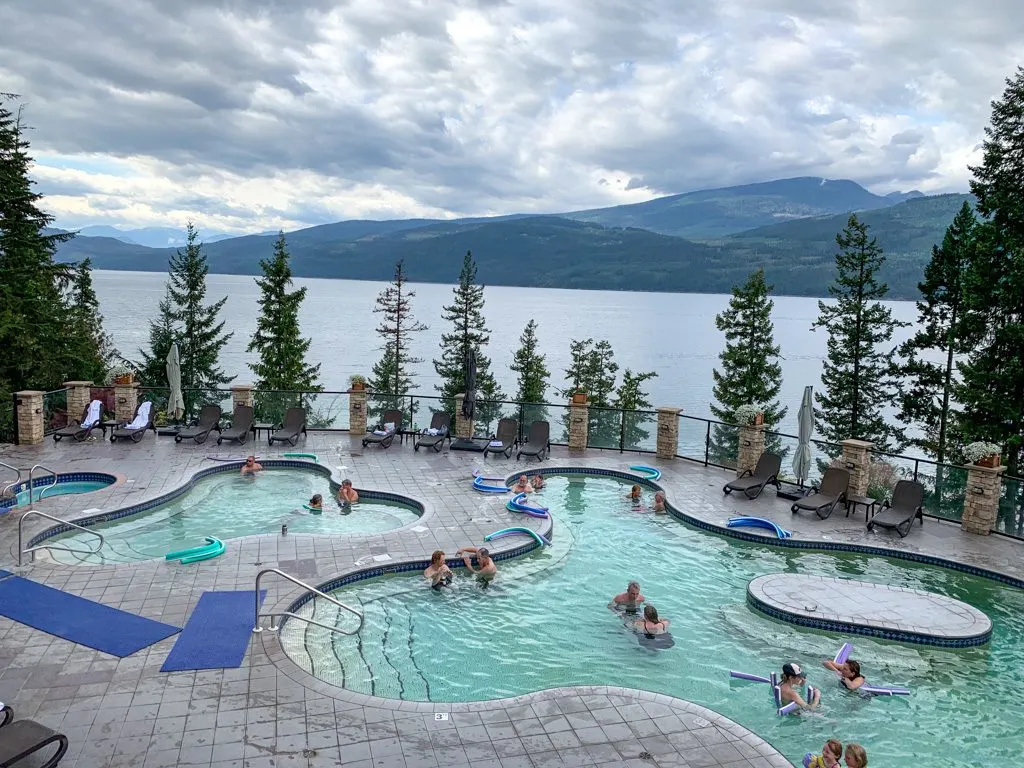
Halcyon Hot Springs is on Highway 23 in the West Kootenays. It sits just above the shore of Upper Arrow Lake. The pools at Halcyon Hot Springs are some of the nicest resort-style pools I’ve been to. (Although I have to admit I only stopped in for a look during a trip to Revelstoke and didn’t have time to actually soak.) Built in the early 2000s, the curved pools have an amazing view of the lake and the Monashee Mountains.
On the upper deck, there is a 42C hot pool, a 37C warm pool, and a cold plunge pool. There’s also a lower deck with a 30C warm pool and a children’s spray park. They also have a spa and a restaurant.
How to Get to Halcyon Hot Springs: The springs are located on highway 23 in between Revelstoke and Nakusp. From Revelstoke take Highway 23 south for 70km. The journey includes the free Arrow Lakes ferry, which runs every hour. From Nakusp, take Highway 23 north for 35km. Here are Google Maps driving directions.
Cost: $15/person
Where to Stay: Halcyon Hot Springs Resort has cabins and camping on site. You can also stay in Revelstoke, which is about an hour away.
Halfway River Hot Springs
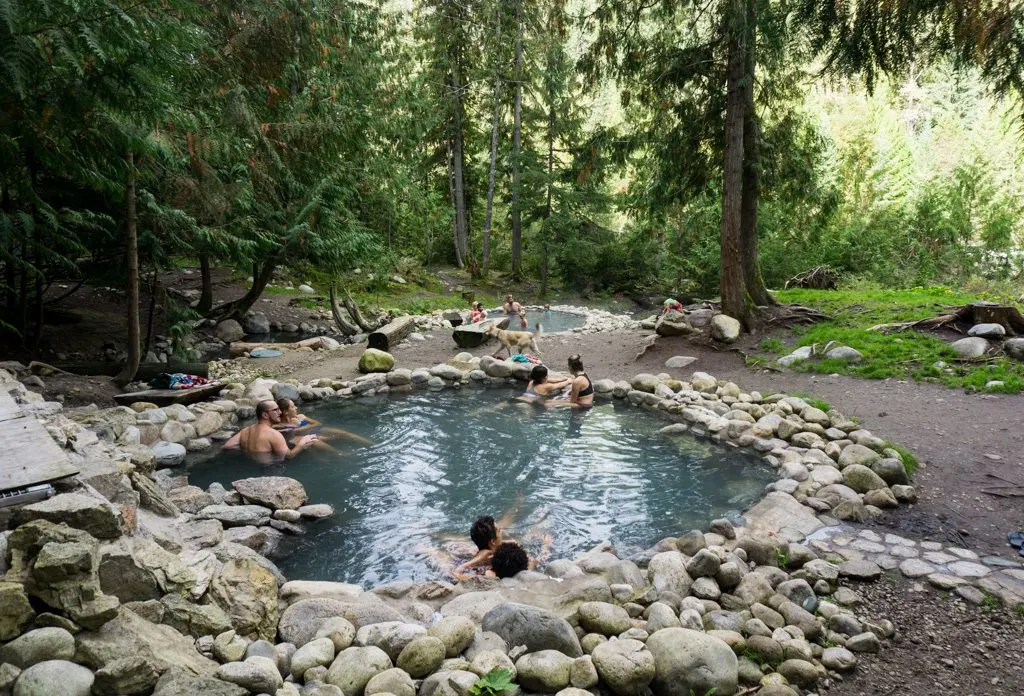
The hot springs at Halfway River are one of my favourite natural hot springs in Canada and one of the reasons I love going to Revelstoke. The springs are near Arrow Lake and Halcyon Hot Springs south of town.
There are several pools lined with river rocks near the rushing Halfway River. There are also a few pools on the edge of the river itself. Some of the pools are really hot, but most are about 42C. If you get too warm, go for a plunge in the river.
The 10-minute walk to the springs from the parking lot is one of my favourite hikes in Revelstoke. You head steeply downhill on switchbacks and stairs. There is an outhouse near the bottom of the stairs and a changing hut right next to the main pools.
How to Get to Halfway River Hot Springs: These hot springs are located on a gravel road off Highway 23 in between Revelstoke and Nakusp. From the turnoff on Highway 23, it’s 11km of gravel road driving to the parking lot. The road is fine for 2wd vehicles as long as you go slow and avoid the potholes. Here are Google Maps driving directions.
Cost: Free
Where to Stay: You can camp on-site either in a car-accessible campground or in walk-in sites that are just steps from the pools. If you prefer something less rustic, the cabins at Halcyon Hot Springs are the closest, or you can book a hotel in Nakusp or Revelstoke.
Nakusp Hot Springs
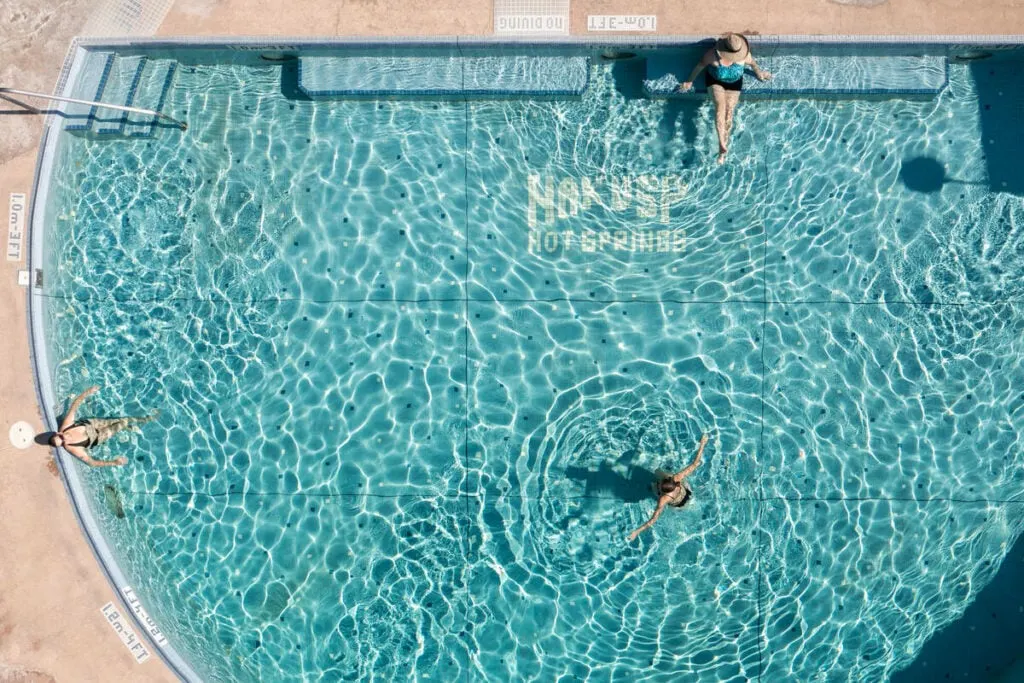
The Nakusp Hot Springs near the village of Nakusp have the distinction of being the only community-owned hot springs in BC. Unlike other commercially developed springs, these hot springs are the property of the village of Nakusp. There are two outdoor pools: a hot pool at 38-41C and a warm pool at 36-38C. I’ve never visited this hot spring, but I hear it’s one of the least crowded developed hot springs in BC since it’s not near a major centre.
How to Get to Nakusp Hot Springs: Nakusp is located on the eastern shore of Arrow Lake along Highway 23. From Nakusp, take Highway 23 north, then turn right onto Hot Springs Road. The springs are 12km up this road. The drive from town takes about 15 minutes. Here are Google Maps driving directions.
Cost: Adults: $14; Seniors, Students, and Kids: $13, Kids 5 and under: free
Where to Stay: You can camp right at the springs, or stay in one of their rustic chalets. There are also hotels and motels in the town of Nakusp.
Ainsworth Hot Springs
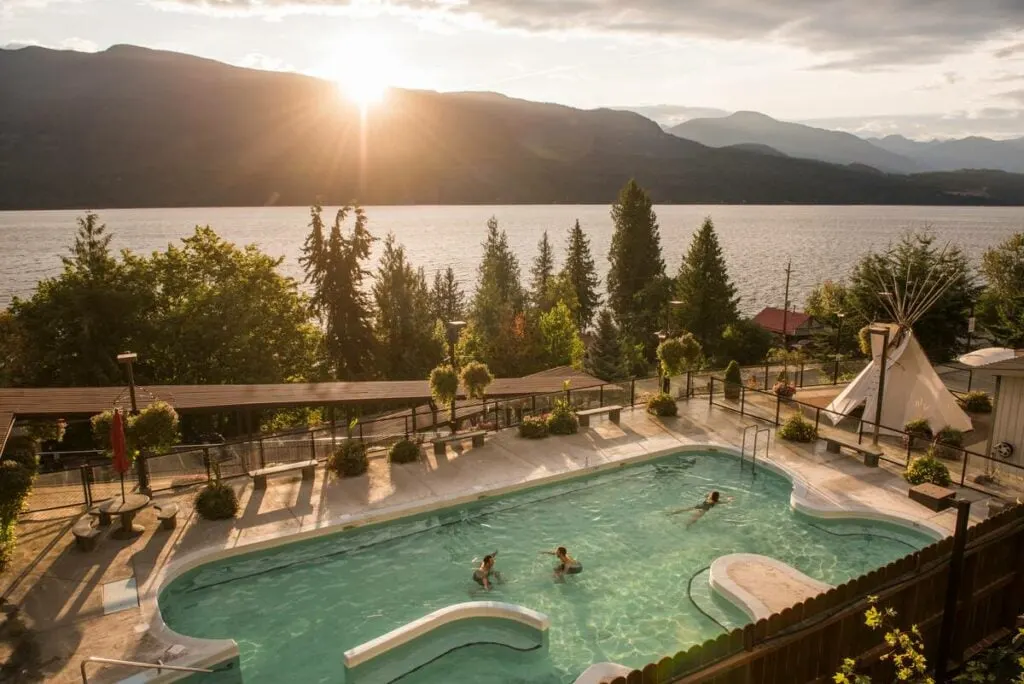
If you’re visiting Nelson, you HAVE to visit nearby Ainsworth Hot Springs. I went for a soak in the springs right after a 3-day backpacking trip in Kokanee Glacier Provincial Park. So relaxing!
It is one of the most unique hot springs I’ve been to. It’s a commercial hot springs with an outdoor pool for soaking, but the interesting part is the caves!
Okay, so they aren’t true caves, but they are really cool. Early settlers dug tunnels into the rock to try to improve the flow of the springs. The tunnels form an “H” shape with two entrances. Inside the water is hotter than anywhere else at the springs and its REALLY steamy. In a few places, hot water cascades down the walls in mini-waterfalls. There are a couple of carved niches where you can sit and enjoy the sauna-like atmosphere. However, it’s way too hot for me to stay long.
The outdoor pool is 36-38C and the waters in the cave are 40-43C. There is also a cold water plunge pool if you need to cool off. They have a spa as well as a restaurant that serves food sourced from local ingredients and indigenous inspired dishes.
The springs are run by the local Ktunaxa First Nation. They have used the springs for cultural and spiritual purposes since time immemorial. The Ktunaxa name for the hot springs is Nupika wu’u which means “Spirit Waters”.
How to Get to Ainsworth Hot Springs: Ainsworth Hot Springs is located on Highway 31 along the shores of Kootenay Lake. From Nelson, take Highway 3A east, then Highway 31 north. The drive takes about 45 minutes. Here are Google Maps driving directions.
Cost: Adults: $18, Seniors: $17, Teens: $15, Kids: $12, Babies 2 and under: Free. Note: You must make advance reservations to use the pools.
Where to Stay: You can book rooms on-site at the Ainsworth Hot Springs Resort. Otherwise, there are lots of hotels in Nelson.
Lussier Hot Springs
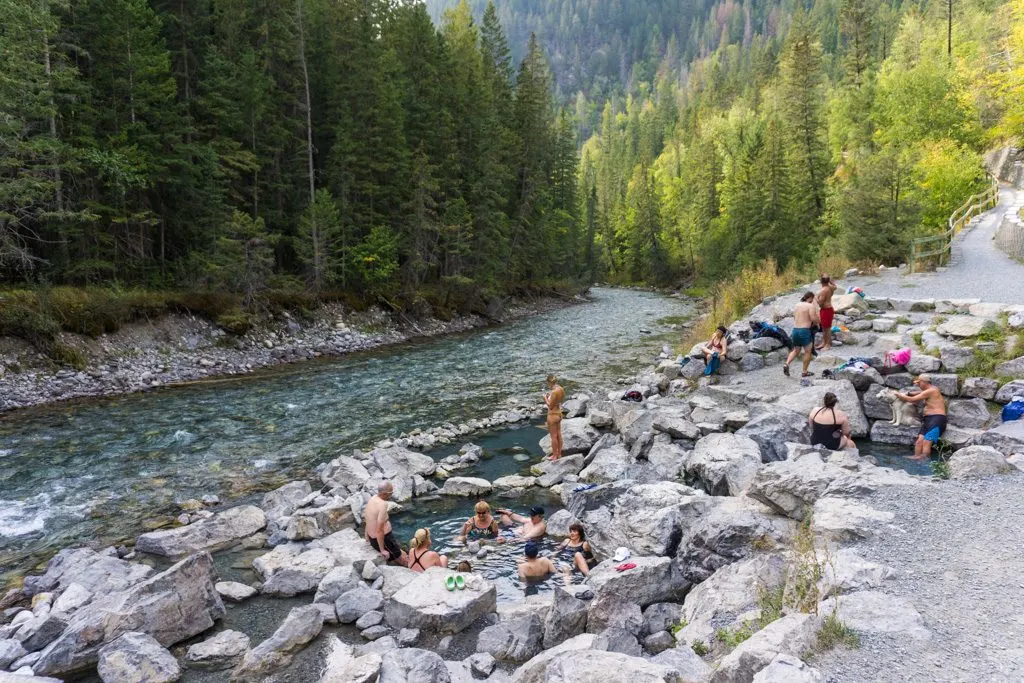
Lussier Hot Springs is a natural hot spring in Whiteswan Lake Provincial Park near Canal Flats in BC’s East Kootenays. It has beautiful rock-lined pools right next to Lussier Creek. I visited as part of a road trip through the Kootenays and it was one of the highlights of my trip.
The upper pool is the hottest at about 43C. There are also a couple of lower pools that are a bit cooler. When there is less flow in the creek, there are pools right next to the creek too.
To reach the pools you need to walk down a short, but steep trail from the parking lot. There are outhouses at the parking lot but no facilities down at the pools. There is no change house so change in the outhouse or get ready in your car.
How to Get to Lussier Hot Springs: The hot springs are on a gravel road accessed from Highway 93. From Canal Flats, head south on Highway 93 for 5km to the Whiteswan Lake Forest Service Road. It’s a gravel road but unless it is icy or snowy, it should be fine for all vehicles. Follow this road for 17.5km to the hot springs just inside the entrance to Whiteswan Lake Provincial Park. The drive from the highway takes about 20 minutes. Here are Google Maps driving directions.
Cost: Free
Where to Stay: There are several campgrounds in Whiteswan Lake Provincial Park. There aren’t a lot of hotels in nearby Canal Flats, but there are some cute Airbnbs in the area.
Fairmont Hot Springs
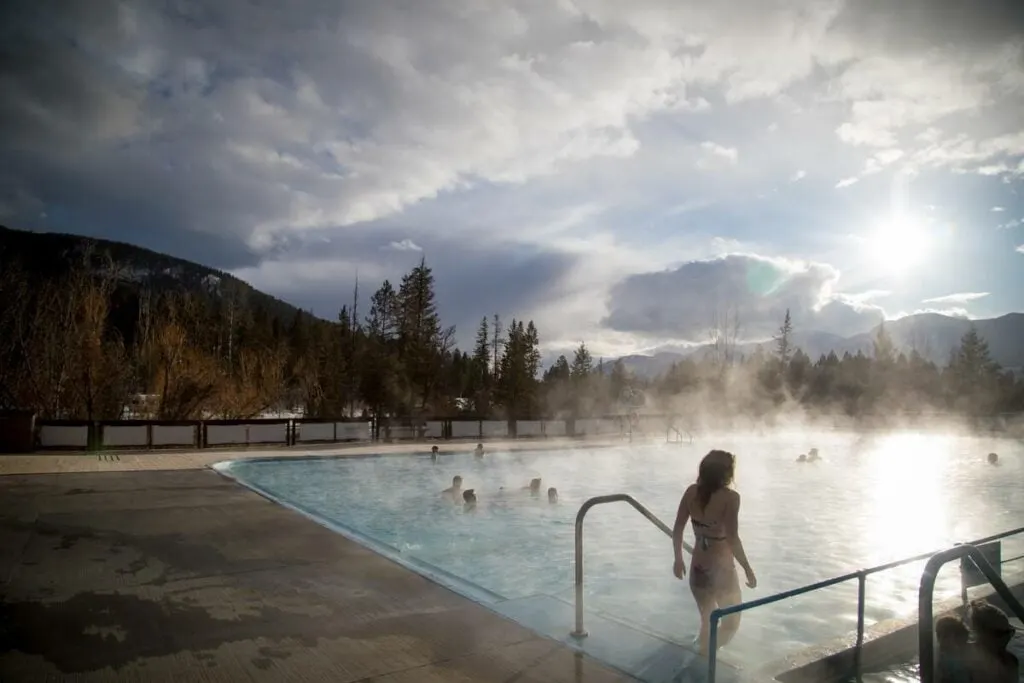
Fairmont Hot Springs is a resort-style hot springs on Highway 93 in the East Kootenays. I haven’t visited these hot springs yet, but I’m sure I’ll visit on my next trip through the area.
The resort has a hot pool for soaking (39C), a family-friendly swimming pool (32C) and a dive pool (30C) with two diving boards. There’s a spa and several restaurants. If you want to get fancy, you can also book a Miami-style poolside cabana for the day.
If you want to skip the commercialized springs and dip into history, you can take a short hike to the Indian Baths. This 100-year-old stone structure houses small bathtubs fed by the hot springs. It’s also totally free. Find the trailhead in the parking lot.
How to Get to Fairmont Hot Springs: The hot springs are in the village of Fairmont Hot Springs on Highway 93 in the East Kootenays. It’s 23km south of Invermere and 25km north of Canal Flats. From the highway, head east on Fairmont Resort Road for 1.5km to reach the parking lot. Here are Google Maps driving directions.
Cost: $17 for adults, $15 for kids and seniors. Kids 5 and under are free.
Where to Stay: Stay on-site at the Fairmont Hot Springs Resort. They have an RV park and campground too.
Radium Hot Springs
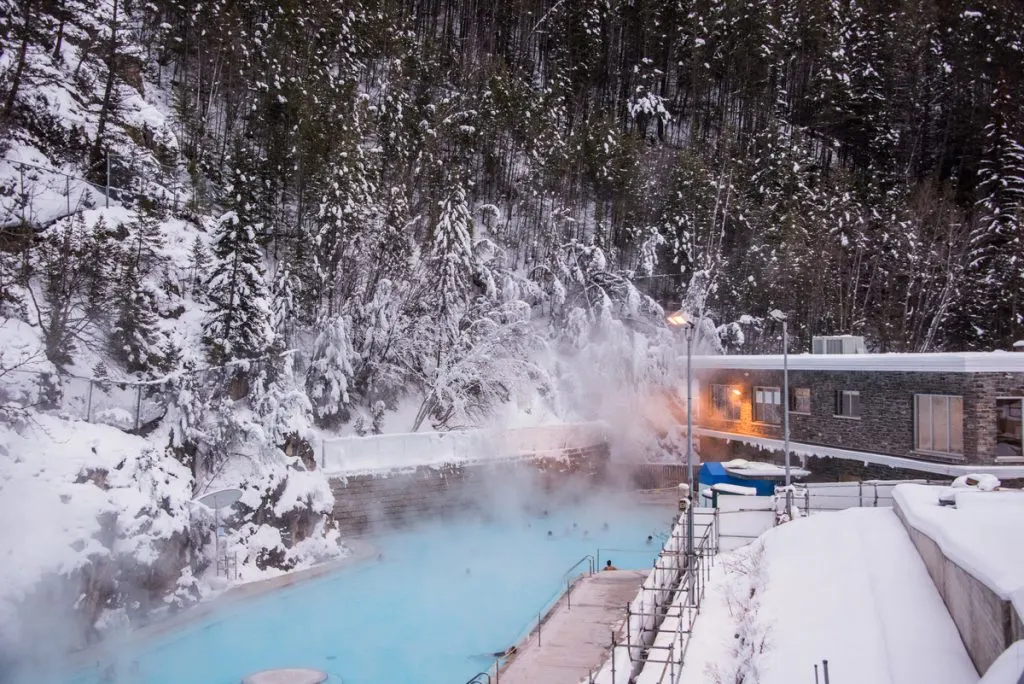
Radium Hot Springs is located in a tight canyon next to Highway 93 at the southern end of Kootenay National Park. There has been a hot spring resort here for over 100 years. The current stone buildings date to the 1950s but underwent a huge renovation in 2023 and 2024.
There are two pools. The hot pool is about 39C. There is a unique island in the middle where the hot water bubbles out. The swimming pool is 27-29C and includes a diving board and slide. The water is the most radioactive in Canada since it contains radium. But the radioactivity is still very, very weak so it won’t harm people. (Don’t worry!)
Getting to Radium Hot Springs: The springs are on Highway 93 just 3 kilometres east of the junction with Highway 95. The village of Radium Hot Springs is right at the junction, but the springs themselves are not. Here are Google Maps driving directions.
Cost: Adults: $17.50, Seniors and kids: $15.25, Babies under 3: free
Where to Stay: There are lots of hotels in the nearby village of Radium Hot Springs. Kootenay National Park’s Red Streak Campground is also nearby.
Hot Springs in the Canadian Rocky Mountains
Canada’s Rocky Mountain National Parks like Banff and Jasper are some of the most popular tourist destinations in the country. They also have hot springs.
Banff Upper Hot Springs
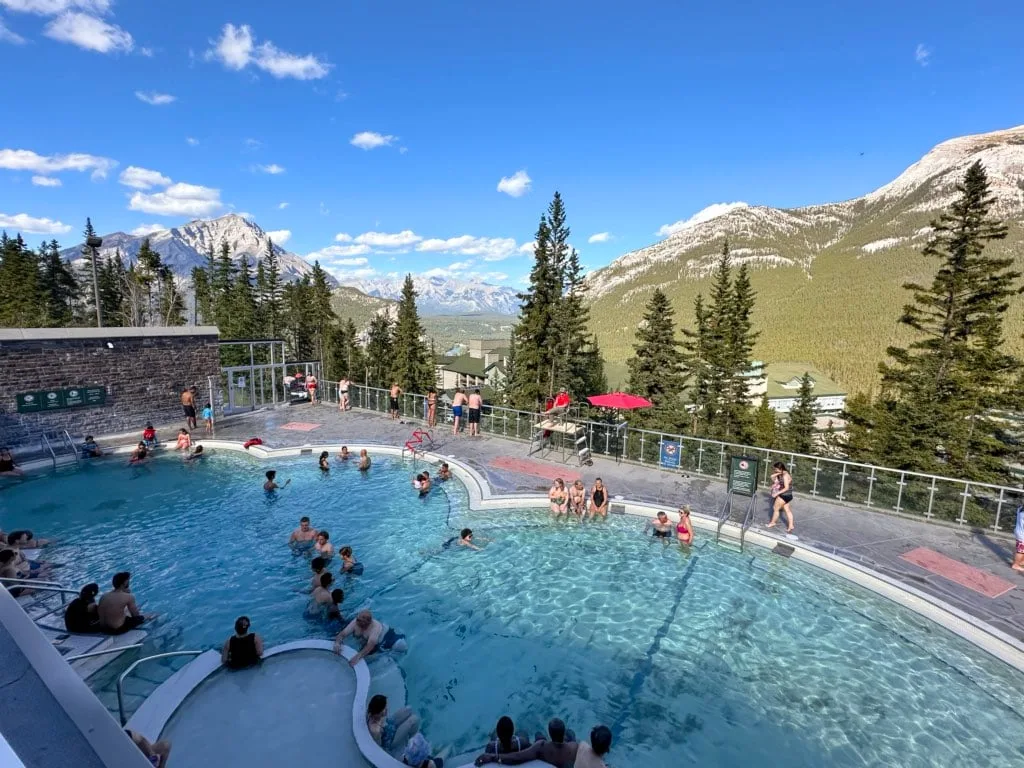
There Upper Hot Springs in Banff are the most famous hot springs in Alberta.
I first visited these hot springs during a September road trip over ten years. It started to snow so instead of hanging around the chilly campground, we went for an evening soak in the hot springs instead. Magical! Since then I’ve visited a few more times including a visit in November when it snowed again!
It’s a commercialized pool, but the stone buildings are quite beautiful since they were built in the 1930s. If you want to really get into the vintage vibe, you can rent a heritage swimsuit. The 39C outdoor pool has great views of the surrounding mountains. I loved it in the snow! There’s a cafe too.
How to get to Banff Upper Hot Springs: From downtown Banff take Banff Avenue over the Bow River Bridge. Turn left on Spray Avenue, then take the next right onto Mountain Avenue. Stay on Mountain Avenue until it ends at the Upper Hot Springs. You can also take the Roam bus route 1 since parking is limited. Here are Google Maps driving directions.
Cost: Adults: $17.50, Seniors and kids: $15.25, Babies under 3: free
Where to Stay: There are lots of hotels in Banff. The nearest hotel is the Rimrock Resort Hotel which is a 2-minute walk away. My sister used to work there and it’s gorgeous. There are also several national park campgrounds nearby. To save money, consider staying in Canmore, which is a short drive away.
READ NEXT: 9 Beautiful Reasons to Visit Banff in the Fall and Best Things to Do in Banff in the Spring
Miette Hot Springs
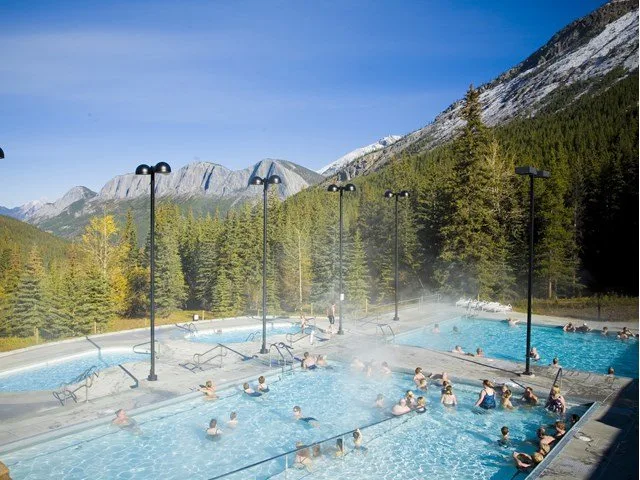
Miette Hot Springs is off Highway 16 east of the town of Jasper in Jasper National Park. Besides Banff, it’s one of the only Alberta hot springs. I visited these springs on a chilly fall trip to Jasper. It was a great way to warm up on a cold day.
The spring is one of the hottest springs in the Rockies. It’s 54C at the source, but they cool it down to between 37C and 40C in the pools. There are two warm pools, plus two cold pools.
The pools and buildings were built in the 1980s and aren’t as picturesque as the other national park hot springs. But the mountain scenery makes up for it. There’s also a cafe if you get hungry.
How to get to Miette Hot Springs: From the town of Jasper, head east on Highway 16 for 43km. Turn right onto Miette Road and drive 16.5km to its end at the hot springs. The drive takes about an hour. Here are Google Maps driving directions.
Cost: Adults: $17.50, Seniors and kids: $15.25, Babies under 3: free
Where to Stay: There are lots of hotels in Jasper as well as National Park campgrounds. The closest accommodation to the hot springs are the Pocahontas Cabins and the National Park’s Pocahontas Campground is the closest to the hot springs.
Hot Springs in Northern BC
Northern BC sees a fraction of the tourist traffic that the rest of the province. Which means that you can visit some spectacular hot springs without worrying about crowds.
G̱andll K’in Gwaay.yaay (Hot Spring Island)
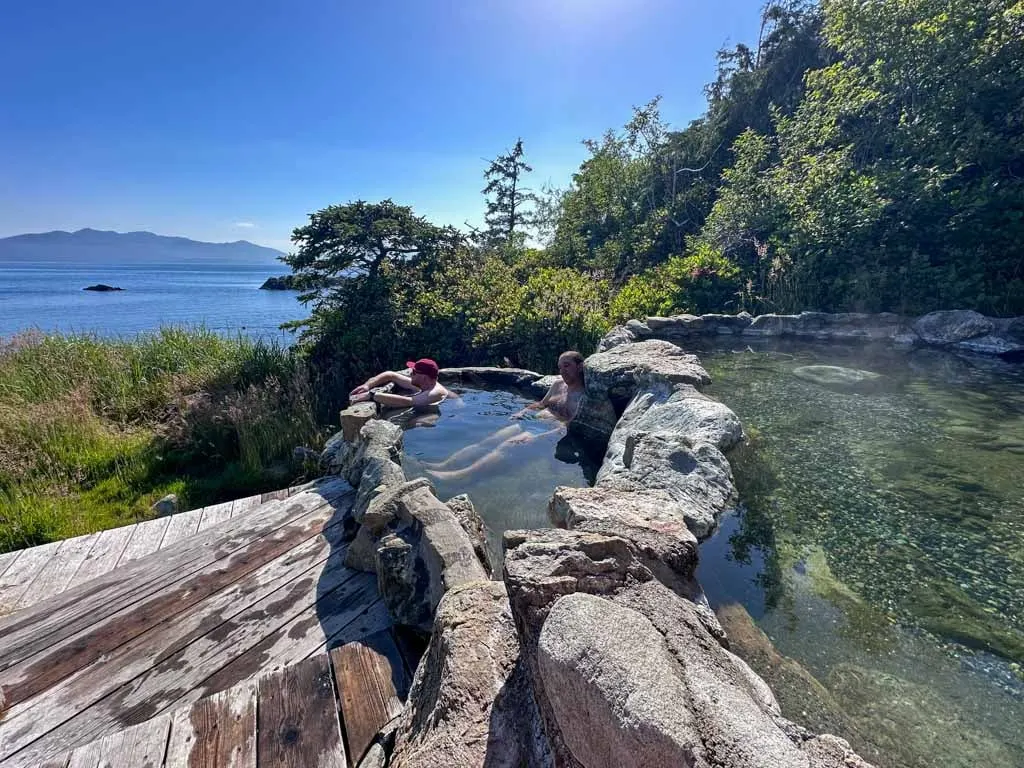
G̱andll K’in Gwaay.yaay (Hot Spring Island) is a small island in Gwaii Haanas National Park Reserve in BC’s Haida Gwaii (formerly known as the Queen Charlotte Islands). The Haida name for the springs is Gandll K’in Gwaay,yaay, which means “hot water island”.
Historically, there were numerous springs on the southwestern end of the island. But after an earthquake in 2012, the hot springs stopped flowing. Scientists still aren’t sure why. But slowly, the hot water has been returning to the area. In 2017 three new pools were built. There are changerooms and outhouses too.
I visited these springs as part of a four-day tour around Gwaii Hanaas National Park. The water in some of the pools is really hot! But the views are incredible.
How to Get to Hot Spring Island: The only way to get there is by boat, but there are lots of tour operators who will take you. You can also rent kayaks and go on your own if you get a permit from Parks Canada. Most boat trips leave from Moresby Camp on nearby Moresby Island.
Cost: Free, but you do need to pay National Park admission fees
Where to Stay: The closest hotels are in the village of Daajing Giis (Queen Charlotte). You can also camp at Moresby Camp.
Higu Isgwit (Nass Valley) Hot Springs
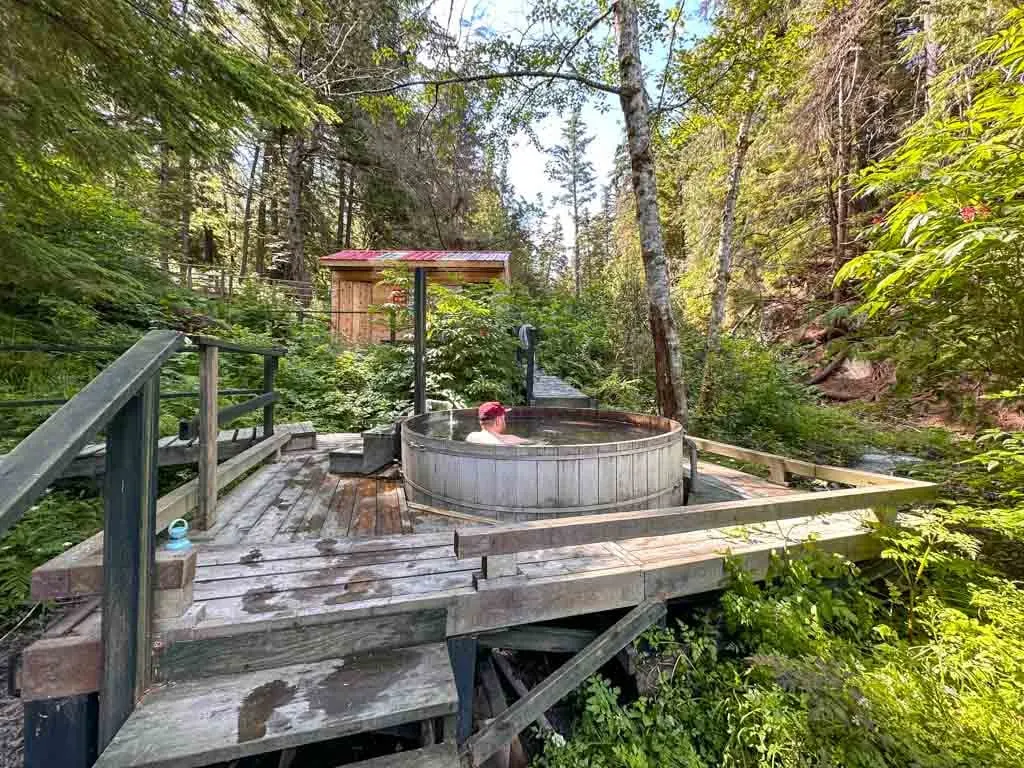
These hot springs are located in Nisga’a First Nation territory near Nisga’a Memorial Lava Bed Provincial Park. Since they are located in the Nass River Valley, they are also known as Nass Valley Hot Springs. In the Nisga’a language, they are called Hlgu Isgwit Hot Springs. This is a culturally and spiritually important site for the Nisga’a so be respectful if you visit.
It’s a short 5-minute hike on a boardwalk across a marshy area to reach the springs. There’s a large pool with wooden decking and recently the area has been improved by adding a couple of wooden sided tubs. The springs are about 55C, which is too hot for most. Thankfully, there are pipes with cold water you can add to adjust the temperature. There’s an outhouse in the parking lot and a small change house next to the springs.
Visiting these Nisga’s Nation-run springs was one of the highlights of my two-day visit to the Nass Valley. We also hiked to a volcano, walked through lava, visited a great Indigenous museum, and lots more.
How to Get to Higu Isgwit Hot Springs: From Terrace, BC, drive north on the Nisga’a Highway for 96km. Turn left on Nass Road and follow it for 19km. Look for the signed parking area. Here are Google Maps driving directions.
Cost: $8 for adults, $5 for children. You need to reserve a one-hour spot in advance by calling 250-633-3000.
Where to Stay: The closest major centre is the town of Terrace, which has lots of hotels. You can also camp in the provincial park or stay at a bed and breakfast in the nearby village of New Aiyansh or in Nisga’a-run B&Bs in the Nass Valley.
Liard River Hot Springs
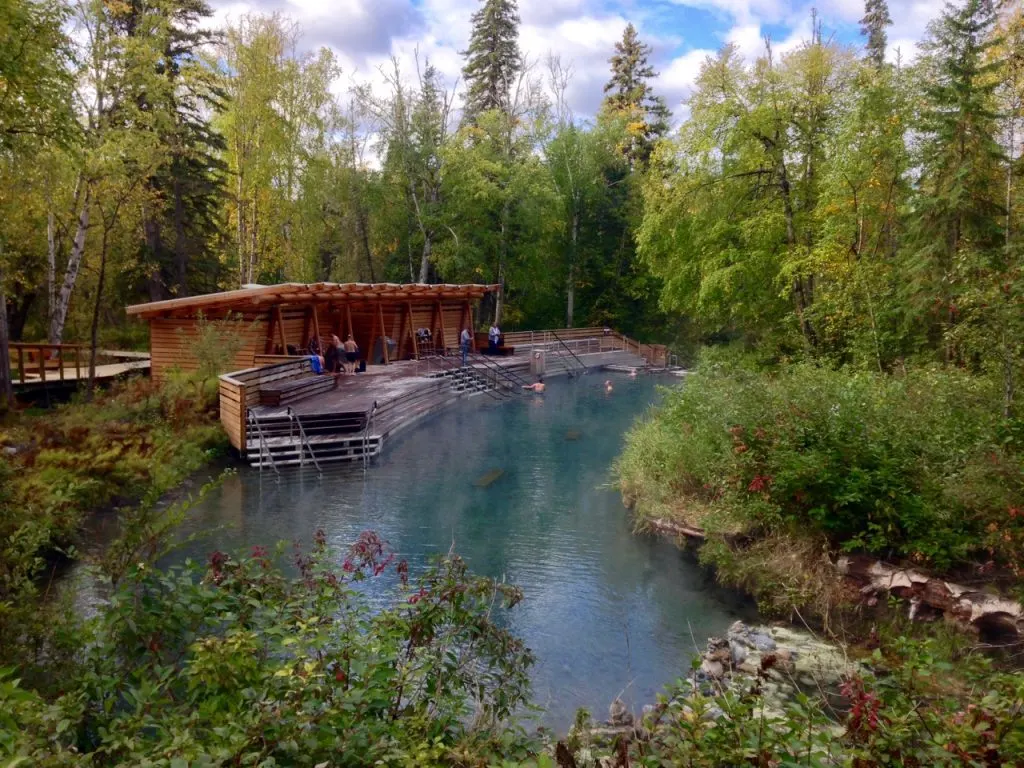
Without a doubt, Liard River Hot Springs is the best hot springs I’ve ever visited. That includes visits to hot springs in Canada as well as ones in Iceland and Nepal. This beautiful hot spring is on the Alaska Highway in Northern BC. It’s actually closer to the Yukon border than to any town in British Columbia.
The hot springs are in a natural setting, but the provincial park has improved the pools to add a gravel bottom and some wooden decking. A small waterfall separates the upper pool from the lower pool, which is much more rustic and still has natural earthen sides. The upper pool is hotter, about 52C at the source, and the lower pool is cooler at about 42C. There is a change house next to the pools and composting toilets nearby.
To reach the pools you’ll walk for about 600m on boardwalk across a marsh. Keep an eye out for moose along the way. We spotted one every time we walked to the pools. The park is also an important habitat for bison and you may see them on the highway nearby or even in the campground.
How to Get to Liard River Hot Springs: From Fort Nelson, BC drive 305km north on Highway 97 (the Alaska Highway). The drive takes about 4 hours. From Watson Lake, Yukon Territory, drive 208km south on Highway 97. It’s a 3-hour drive. Here are Google Maps driving directions.
Cost: $5 for adults, $3 for children
Where to Stay: Stay at the provincial park campground since it’s closest to the pools. Plus access to the hot springs is included in your camping fees. If you prefer a hotel, there’s a lodge on the other side of the highway.
Hot Springs in the Yukon
There is only one hot spring in the Yukon: Eclipse Nordic Hot Springs.
Eclipse Nordic Hot Springs
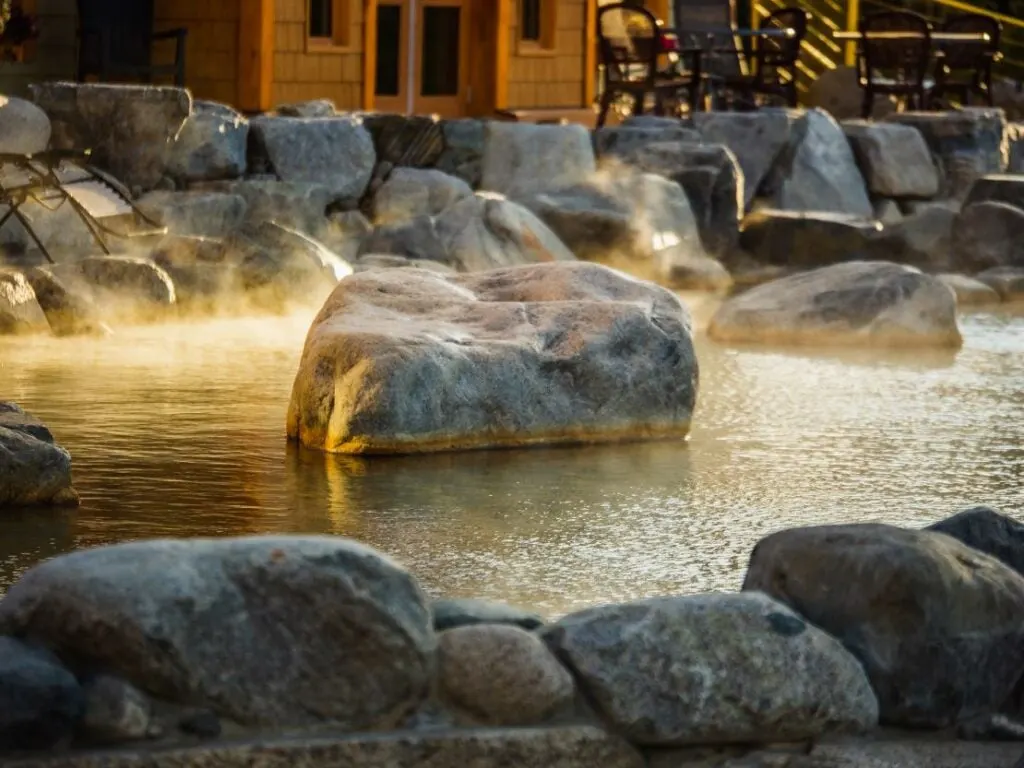
This hot spring used to be called Takini Hot Springs, which I visited on a trip to the Yukon back in 2015. The pool and facilities have been completely rebuilt and in 2022 they reopened as Eclipse Nordic Hot Springs.
The new facility is an upgrade over the old concrete pool. I haven’t visited yet but looks really beautiful. There are three pools with a Japanese design that integrates rocks into the pool for lounging and reclining. The largest pool even has a waterfall. The water temperature ranges from 42 to 36C.
There are also indoor relaxation rooms with heated tile loungers, cold plunges, showers, saunas, and steam rooms.
How to get to Eclipse Hot Springs: From Whitehorse, drive Highway 1 west to the junction with Highway 2. Follow Highway 2 north for 6km. Turn left onto Takhini Hot Springs road and follow it for 9km to the springs. The entire trip takes about 30 minutes. Here are Google Maps driving directions.
Cost: $60
Where to Stay: There’s a large campground and a hotel on-site, which is really convenient. Or you can book a hotel in Whitehorse.
Final Thoughts
So there you have it: 19 of the best hot springs in Canada. So far, I’ve visited ten of them.
My favourite commercial hot spring is Ainsworth Hot Springs. Liard River Hot Springs is my favourite natural hot springs. When it comes to free hot springs, for me, it’s a bit of a tie between Lussier and Halfway River Hot Springs. And G̱andll K’in Gwaay.yaay (Hot Spring Island) in Haida Gwaii is special since its so remote.
What’s your favourite? Tell me in the comments.
More Adventures in Canada:
- Best Small Towns in Canada for Outdoor Adventures
- 40 Cheap and Free Things To Do in Whistler
- 15 Things to do in Revelstoke in the Summer
- Sea to Sky Highway Road Trip Guide: Driving from Vancouver to Whistler
- 37 Things to do in Whistler in Winter
- The Ultimate Guide to the Pacific Marine Circle Route on Vancouver Island
- Chasing Waterfalls in Wells Gray Provincial Park
- 20+ Beautiful Weekend Getaways from Vancouver
- How to Take an Epic Canadian National Parks Road Trip
- The Best Canadian Adventure Books
- Cozy Cabins near Vancouver Perfect for a Weekend Getaway
- The Best (and Worst) Backpacking Meals Reviewed - December 16, 2025
- My Favourite Hiking Gear of 2025 - December 9, 2025
- Best Insulated Skirts For Hiking and Snowshoeing in 2026 - December 5, 2025

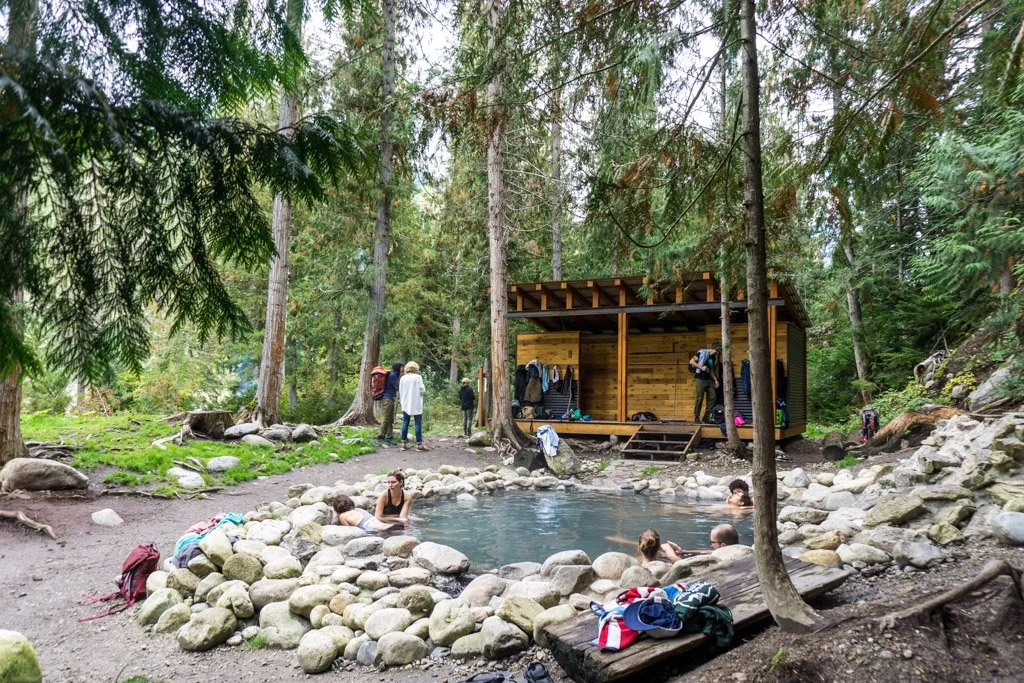
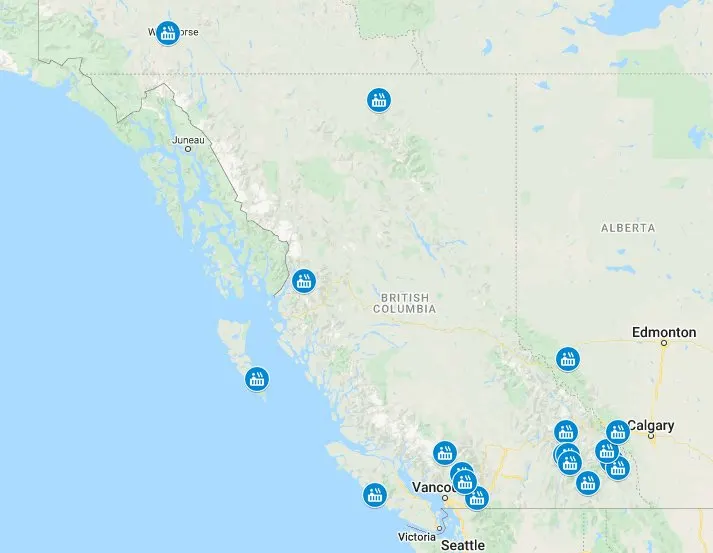
Ashley
Sunday 26th of January 2020
Thank you for this beautiful site, you have done an amazing job and it's by far the most detailed and user easy guide! You should re-write it for the Government lol!
Taryn Eyton
Sunday 26th of January 2020
So glad you liked it Ashley! Enjoy the hot springs 😃
Costumelooks
Monday 7th of October 2019
And getting there is half the fun – you’ll pass through mountain territory, semi-arid, desert-like landscapes, see rushing rivers, beautiful lakes, look out for wildlife and be surrounded by the best that British Columbia and Alberta has to offer. The trip doesn’t have to end at your destination, either - add a rental car or a motorcoach tour and discover the pristine wilderness or unwind in amazing spas, hotel hot tubs and hot springs. You’ll never feel better.